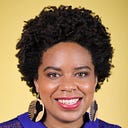It’s Time to Rethink Domestic Violence Prevention… Without Police
As someone who is a survivor of domestic violence I experienced great harm at the hands of my ex partner, and yet I chose not to press assault or false arrest charges. This lived experience only complemented what I learned about abolition while at Brown University so that, at this point in my life, I feel I have an intellectual, personal, and spiritual connection to the goal of abolition. I wanted to take the time to talk about this as we end Domestic Violence Awareness Month.
I am not alone. Many survivors choose not to press charges and while I can’t speak for everyone I want to speak for my beliefs today. Let’s properly address Domestic Violence and whenever possible prevent harm from happening in the first place.
Our communities, and Black women specifically, are not served nor protected by increase surveillance and cops. We are served and protected by systems of community care.
Domestic violence can include sexual violence, physical violence, and/or stalking by an intimate partner. About 1 in 4 women and 1 in 10 men in the U.S. reported experiencing domestic violence in their lifetime. In NYC’s District 9 alone, there were at least 1,456 domestic violence incident reports in 2019, with many more going unreported. Amid the COVID-19 pandemic and resulting shutdowns and economic distress, domestic violence incidents have risen in New York City.
For those who say that increasing law enforcement capacity in an attempt to prevent domestic violence is the answer it is important to note that police presence can actually cause more harm when responding to domestic violence calls. People of color account for the majority of domestic violence survivors, yet calling the police for protection is often not an option due to documented violence against the victim at the hands of police. This was the case in my personal case I, the victim, was the one subject to false arrest.
A majority of U.S. states, including New York, have mandatory arrest policies which require police to make an arrest when responding to domestic violence calls. These laws have led to the false arrest of the victims of domestic violence rather than the abuser, leading to greater violence from the criminal justice system, including forceful arrests and removal of children into state custody. The Family Violence Program of the Urban Justice Center found survivors of domestic violence who called their hotline had been arrested in 27 percent of cases and 87 percent of those arrested were injured by police during their arrest.
On average, only half of callers to the National Domestic Violence Hotline request help from law enforcement and a third actually feel less safe after law enforcement is involved.
It’s time to rethink domestic violence prevention without police.
It’s time to remove the criminal justice system from domestic violence situations and instead implement community-based responses that prioritize the safety of Black and Brown women and LGBTQ+ folx who, for good reason, may be hesitant to rely on state-based systems. We must invest in and implement restorative justice practices in coordination with local domestic violence shelters and counselors to uplift the voices of survivors and respond to the specific needs of participants. We must ensure our communities have the resources to feel safe, secure, and heard.
We must also invest in means of prevention by increasing financial security, emotional care services, healthcare (including mental healthcare), and counseling services. We have to find ways to support and invest in our community’s wellbeing understanding that ultimately we keep us safe.
Let’s use the end of this month, domestic violence awareness month, to take the necessary steps forward towards a world without violence.
Please find these resources below if you or someone you know are feeling unsafe or in need of support:
New York City’s Domestic Violence Hotline: 1–800–621-HOPE (4673) or safehorizon.org
National Domestic Violence Hotline: 1–800–799-SAFE (7233) or chat securely at thehotline.org
Barrier Free Living (services and support for those living with disabilities): bflnyc.org
Anti-Violence Project (services and support for LGBTQ+): 212–714–1141 or avp.org
Kristin Richardson Jordan (KRJ), Candidate for New York City Council District 9 Kristin is a poet, local activist, speaker, teacher, DSA member, Black queer woman, and third-generation Harlemite on a mission to disrupt District 9 (Central Harlem) with radical love. Started almost a year and a half before the murder of George Floyd, her Kristin for H.A.R.L.E.M. political platform includes advocacy for police accountability, abolition, affordable housing, redistribution of resources, senior care, gun control, education, and environmental justice. She is interested in making change both through her grassroots campaign and through a community-based participatory democracy once elected and has drafted policy on each of her HARLEM platform points. Find out more and get involved at KristinForHarlem.com.
